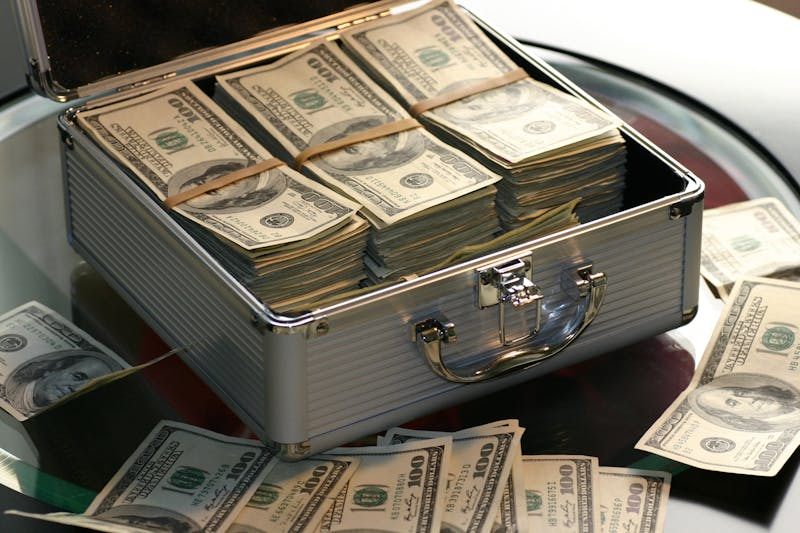We all want to make the most of our hard-earned money, but sometimes our cash slips away in surprising ways. While big expenses are easy to spot, it's often the small, recurring costs that quietly drain our bank accounts. Let's take a closer look at ten common money drains that might be affecting your finances—and how to plug these leaks for good.
1. Unused Subscriptions
The average American spends over $200 monthly on subscription services, yet uses only about half of them regularly. From streaming platforms to digital tools, fitness apps to meal kits—these small monthly charges add up quickly.
Money-saving tip: Conduct a subscription audit every quarter. Make a list of everything you're paying for and be honest about what you actually use. For services with annual plans, set calendar reminders before renewal dates to reassess their value.
2. Food Waste
Americans throw away approximately 30-40% of their food supply, which translates to roughly $1,500 wasted per household annually. Those forgotten vegetables in your crisper drawer and leftovers pushed to the back of your refrigerator represent real money going straight into the trash.
Money-saving tip: Plan meals before shopping, buy only what you need, and designate a weekly "leftovers night" to clear out the fridge. Consider freezing portions of meals when cooking in bulk.
3. Banking and Credit Card Fees
From monthly maintenance fees to overdraft charges and late payment penalties, financial institutions profit from our inattention. Even ATM fees—averaging $4.72 per transaction—can add up to hundreds of dollars yearly if you're not careful.
Money-saving tip: Review your bank statements for recurring fees, switch to fee-free accounts, set up automatic payments for bills, and use only in-network ATMs.
4. Impulse Purchases
Studies show that the average consumer makes three impulse purchases weekly, totaling roughly $314 monthly. That's over $3,700 annually on items you likely didn't need or even particularly want.
Money-saving tip: Implement a 24-hour rule for non-essential purchases. Add items to a wishlist instead of your cart and revisit them after sleeping on it. Most impulse-buy urges fade significantly within a day.
5. Premium Brand Products
Many household staples and over-the-counter medications are virtually identical to their generic counterparts, yet we pay 20-30% more for the brand name. From cleaning supplies to basic pantry items, that premium pricing rarely equates to premium quality.
Money-saving tip: Try store brands for basic household items, cleaning products, and medications. Save brand loyalty for products where you genuinely notice a quality difference.
6. Energy Vampires
Devices that remain plugged in when not in use—like phone chargers, coffee makers, and gaming consoles—continue drawing power. This "phantom energy" can account for up to 10% of your electricity bill.
Money-saving tip: Use power strips to fully cut electricity to multiple devices at once, unplug appliances when not in use, and consider smart plugs that can be programmed or controlled remotely.
7. Bottled Water
At an average cost of $1.50 per bottle, daily bottled water consumption amounts to over $500 annually—for something that flows virtually free from your tap. Beyond the financial cost, consider the environmental impact of all that plastic.
Money-saving tip: Invest in a quality reusable water bottle and, if you're concerned about tap water quality, a water filter pitcher or faucet attachment.
8. Extended Warranties
Retailers push extended warranties because they're highly profitable—not because they provide good value to consumers. Most products either fail within the standard warranty period or last well beyond the extended coverage.
Money-saving tip: Skip extended warranties and instead put that money into a dedicated "repair/replace" savings fund. Many credit cards also offer extended warranty protection as a free benefit.
9. Unused Gym Memberships
The fitness industry thrives on our good intentions. More than 50% of gym memberships go unused, with the average member visiting just twice weekly while paying for unlimited access.
Money-saving tip: Be realistic about your exercise habits. Consider pay-per-visit options, class packages, or home workout alternatives if you're not regularly using your membership.
10. Convenience Foods
Pre-cut fruits and vegetables, individually packaged snacks, and ready-made meals come with a substantial markup—often costing 40-100% more than their whole-food counterparts.
Money-saving tip: Dedicate one hour weekly to meal prep. Wash and chop vegetables, portion snacks into reusable containers, and prepare simple meals that can be refrigerated or frozen for busy days.
The Cumulative Effect
While each of these expenses might seem small in isolation, their cumulative effect can be substantial. By addressing just half of these money drains, the average household could potentially save over $3,000 annually—enough for a vacation, significant debt reduction, or a meaningful boost to retirement savings.
The most effective way to tackle these hidden costs isn't through dramatic lifestyle changes but through increased awareness and small habit adjustments. Track your spending for a month, identifying patterns and potential waste. Then implement targeted changes to address your biggest money leaks.
Remember: Financial freedom isn't just about earning more—it's about keeping more of what you earn. Which of these money drains will you address first?
Share your biggest money-saving wins in the comments below!
For more tips and tricks to save and budget your finances visit WebsitesThatSave.com
Want to learn how to set a family budget check this out HERE!
Want a side hustle to make extra money to help pay off those bills? Check these out Here and Here.




No comments:
Post a Comment